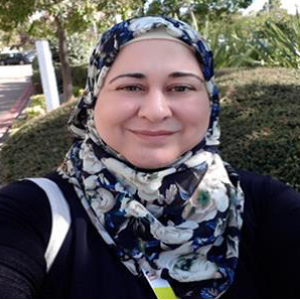Title : The influence of laser beams and light intensities on Jordan cultivated lentil (Lens culinaris Medik) and wheat (Triticum aestivum L.) growth and metabolism
Abstract:
Light is considered as an environmental signal that controlled plants growth and development mainly by supplying sufficient duration, quality and wavelength of light intensities that is responsible for triggering on/off many physiological reactions. The objectives of this study was to examine the role of gamma aminobutyric acid (GABA) shunt pathway specific response in two wheat (Triticum aestivum L.) cultivars (Hurani 75 and Um Qayes) and two lentils (Lens culinaris Medik) cultivars (Jordan 1 and Jordan 2) to blue LED laser (intensity= 1.48 W/cm2) and high intensity invisible ultraviolet light (intensity= 3.99 W/cm2) treatments separately, with respect seed germination, seedling growth, oxidative damage in term of reactive oxygen substances accumulation, GABA accumulation level, total proteins and total carbohydrates level and glutamate decarboxylase gene (GAD) expression. Our results showed a remarkable change of proteins contents, carbohydrates contents, chlorophyll level, dry and fresh weight, GABA accumulation, MDA level, and GAD m-RNA levels under blue LED laser and high intensity invisible ultraviolet light treatments; separately in the both wheat and lentils cultivars. Under all blue LED laser and high intensity invisible ultraviolet light treatments, respectively; there were no significant differences of root emergence in all cultivars. The concentrations of MDA increased in all cultivars under blue LED laser and high intensity invisible ultraviolet light treatments with increasing exposure durations. GABA levels increased and correlated significantly in all cultivars as the exposure duration of blue LED laser and high light intensity increased; separately. Our study showed that a significant deceased of chlorophyll a and b content under all laser and high intensity invisible ultraviolet light treatments. A significant difference was found in proteins content in all used cultivars in response to laser and high intensity invisible ultraviolet light treatments. Carbohydrates content in all cultivars used in this study were significantly decreased under laser treatments. The transcription level of GAD increased significantly under blue LED laser and high intensity invisible ultraviolet light in all used cultivars. Our results indicate that GABA shunt is a key metabolic pathway that allows wheat and lentil to adapt blue LED laser and high intensity invisible ultraviolet light treatments. Generally, based on our results; Hurani 75 and Jordan 2 have higher adaptation mechanism more than Um Qayes and Jordan 1, respectively in response to blue LED laser treatments. Hurani 75 and Jordan 1 could tolerate high intensity invisible ultraviolet light more than Um Qayes and Jordan 2, respectively



